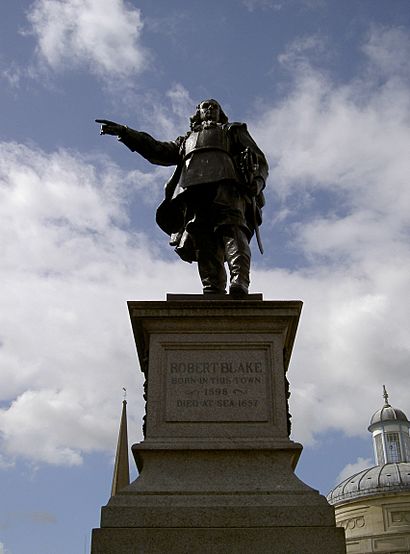Blake Statue facts for kids
Quick facts for kids Blake Statue |
|
|---|---|
 |
|
| Artist | F. W. Pomeroy |
| Completion date | 1900 |
| Medium | Bronze |
| Subject | Robert Blake |
| Location | Bridgwater, Somerset, England |
| 51°07′42″N 3°00′13″W / 51.1284°N 3.0036°W | |
The Blake Statue in Bridgwater, Somerset, England, is a monument to a famous naval leader. It was first shown to the public in 1900. This statue honors Robert Blake, a key figure in English history.
The statue is made of hollow bronze and is life-sized. It was created by the sculptor F. W. Pomeroy. Today, it is recognized as a Grade II* listed building, meaning it is a very important historic structure.
Contents
Why Was the Blake Statue Built?
This special bronze statue was made by F. W. Pomeroy. It cost about £1,200 to create. Lord Brassey officially revealed the statue in 1900.
The statue was built to celebrate a big anniversary. It marked 300 years since Robert Blake was born. Money for the statue came from donations by the public.
Who Was Robert Blake?
Robert Blake was one of the most important military leaders of his time. He served during the period known as the Commonwealth of England. He is remembered as one of England's most famous admirals from the 1600s.
Blake was elected to represent Bridgwater in the English Parliament. When the English Civil War began, he joined the side of the Parliamentarians. This was surprising because he didn't have much military experience before.
In 1649, Blake became a "general at sea," a top naval commander. He fought in important conflicts like the First Anglo-Dutch War and the Anglo-Spanish War. Later, he was given the important role of Lord Warden of the Cinque Ports.
Where Is the Statue Now?
The Blake Statue was not always in its current spot. In 1986, it was moved to where it stands today. Before that, it was located in front of the Corn Exchange building.
What Does the Blake Statue Look Like?
The statue is made of hollow bronze. It shows Robert Blake dressed like a soldier from the Parliament's army. His right arm is stretched out, and he holds a sword in his left hand.
The statue stands on a brick base. This base is surrounded by steps made of granite. On the front of the base, there is an inscription. It reads: "Robert Blake born in this town 1598 died at sea 1657." The other three sides of the base list his many naval victories.

